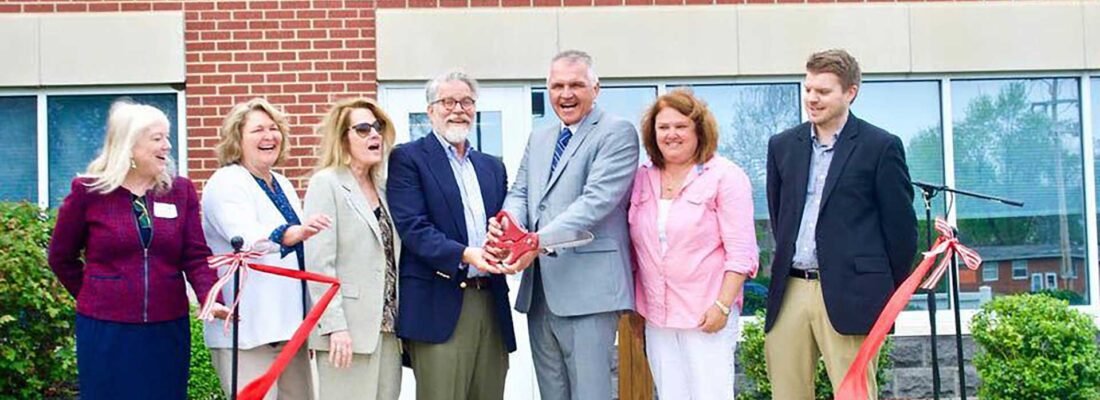Translational Science Benefits
Summary
More than 20 million Americans live with a substance use disorder.1 Despite scientific consensus on a number of effective evidence-based treatments for addiction, only about one in five people with substance use disorders received any treatment in 2019.1 Use of the latest evidence-based treatments is also low among substance use treatment facilities, creating a critical implementation gap in addiction treatment.2,3

Led by Dr. David Patterson Silver Wolf, the Community Academic Partnership on Addiction (CAPA) Collaboration is a partnership between the Brown School at Washington University in St. Louis and St. Louis region addiction treatment providers dedicated to integrating the science of addiction and recovery into real-world treatment settings. CAPA Collaboration is embedded into facilities that offer medical detoxification along with residential and outpatient behavioral health services.
CAPA Collaboration leverages performance-based measurement software, developed by Dr. Silver Wolf’s start-up Takoda, to improve recovery outcomes. The Takoda dashboard, which includes mobile apps, helps clinicians visualize key recovery metrics to guide their patients’ progress. The CAPA Collaboration also provides internships and practicum opportunities for Brown School students and professional development workshops for the collaborators’ workforce to learn about evidence-based treatment practices.
Significance
Clinical supervision in addiction treatment systems has historically been informal, unstructured, and ineffective despite being an important factor in patient recovery outcomes.4 The use of performance-based metrics at CAPA Collaboration will help clinical supervisors make data-driven decisions to more effectively support their patients’ recovery processes. Advancing the science of recovery also has wide implications for the cost of substance use to American society, which amounts to more than $740 billion annually in lost workplace productivity, healthcare expenses, and crime-related costs.5 The academic-community collaboration will also help train the next generation of recovery professionals to use evidence-based practices.
Benefits
Demonstrated benefits are those that have been observed and are verifiable.
Potential benefits are those logically expected with moderate to high confidence.
Development by Takoda of a clinical dashboard, and forthcoming mobile applications, for tracking and visualizing recovery metrics to more effectively guide the patient recovery process. demonstrated.
Clinical
CAPA Clinic provides training to the current clinical workforce and future professionals to increase provision of evidence-based addiction treatment. demonstrated.
Community
CAPA Clinic increased addiction treatment completion rates by 11% over a six-month time period. demonstrated.
Community
CAPA Clinic aims to increase adherence to evidence-based addiction treatment and reduce the use of practices that are not empirically proven by guiding treatment decisions with performance data. potential.
Community
Creation of Takoda, a startup aimed at creating customized tools to improve therapist success and patient outcomes, which are currently being tested in various treatment systems. https://www.takoda.io/. demonstrated.
Economic
Improved recovery outcomes have the potential to increase productivity and reduce healthcare and crime-related costs of addiction. potential.
Economic
This research has clinical, community, and economic implications. The framework for these implications was derived from the Translational Science Benefits Model created by the Institute of Clinical & Translational Sciences at Washington University in St. Louis.6
Clinical
Takoda, a startup co-founded by Dr. Patterson Silver Wolf, developed a clinical dashboard for therapists to track and visualize recovery metrics, which was deployed at one CAPA Collaboration.7 Therapists can monitor recovery progress in real-time, adjust treatment interventions to meet patients’ needs, and share progress with clients to increase motivation. The platform allows therapists to enter data directly and captures data from patients’ smartphones as they pursue recovery in the community.
Community
The CAPA Collaboration is improving the quality of addiction treatment by increasing performance-based treatment and reducing reliance on informal addiction management, which is not empirically proven to improve recovery outcomes. The Collaboration is also training current clinical professionals and graduate students in evidence-based addiction treatment through the provision of internships, practica, and professional development. The goal of this training is to increase the delivery of evidence-based practices by developing a generation of treatment therapists who rely exclusively on evidence-based strategies. The Collaboration has already demonstrated promise at reducing the incidence of substance use disorders: treatment completion rates increased by 11% at one site in the first six months of a CAPA Collaboration partnership.8
Economic
Dr. Patterson Silver Wolf co-founded Takoda, a startup company to develop and manufacture technology-based solutions to aid addiction therapists and improve recovery outcomes. Since 40-60% of people with substance use disorder relapse within a year after treatment,9 improving recovery outcomes has the potential to reduce the substantial economic burden of addiction on society ($740 billion in 2019 alone) by improving productivity, reducing healthcare costs, and reducing crime-related costs.5
- Substance Abuse and Mental Health Services Administration. Key Substance Use and Mental Health Indicators in the United States: Results from the 2019 National Survey on Drug Use and Health. Center for Behavioral Health Statistics and Quality, Substance Abuse and Mental Health Services Administration. Accessed October 21, 2020.
- Knudsen HK, Abraham AJ, Roman PM. Adoption and Implementation of Medications in Addiction Treatment Programs. J Addict Med. 2011;5(1):21-27. doi:10.1097/ADM.0b013e3181d41ddb
- Miller WR, Sorensen JL, Selzer JA, Brigham GS. Disseminating evidence-based practices in substance abuse treatment: a review with suggestions. J Subst Abuse Treat. 2006;31(1):25-39. doi:10.1016/j.jsat.2006.03.005
- Ramsey AT, Baumann A, Silver Wolf DP, Yan Y, Cooper B, Proctor E. The Need for Data-Informed Clinical Supervision in Substance Use Disorder Treatment. J Addict Dis. 2017;36(2):117-126. doi:10.1080/10550887.2017.1291051
- National Institute on Drug Abuse. Costs of Substance Abuse. National Institute on Drug Abuse. Published –. Accessed October 21, 2020.
- Institute of Clinical & Translational Sciences at Washington University in St. Louis. Translational Science Benefits Model website. Published February 1, 2019. Accessed October 21, 2020.
- Takoda – Advancing Treatment for Addiction. Accessed October 21, 2020.
- Washington University in St. Louis. CAPA Clinic shows promising results for addiction treatment patients in St. Louis. The Source. Published September 5, 2019. Accessed October 21, 2020.
- McLellan AT, Lewis DC, O’Brien CP, Kleber HD. Drug Dependence, a Chronic Medical Illness: Implications for Treatment, Insurance, and Outcomes Evaluation. JAMA. 2000;284(13):1689. doi:10.1001/jama.284.13.1689

